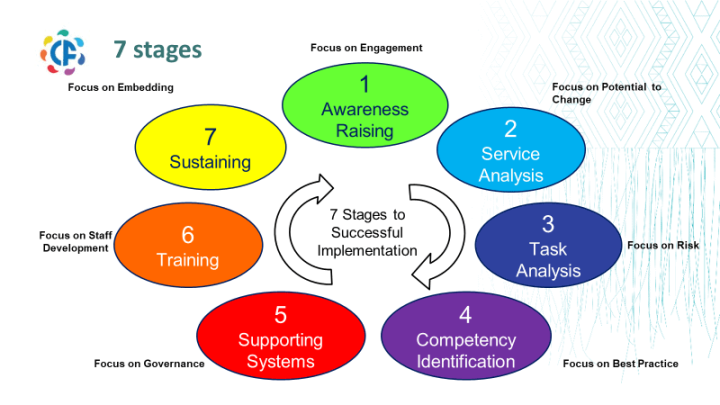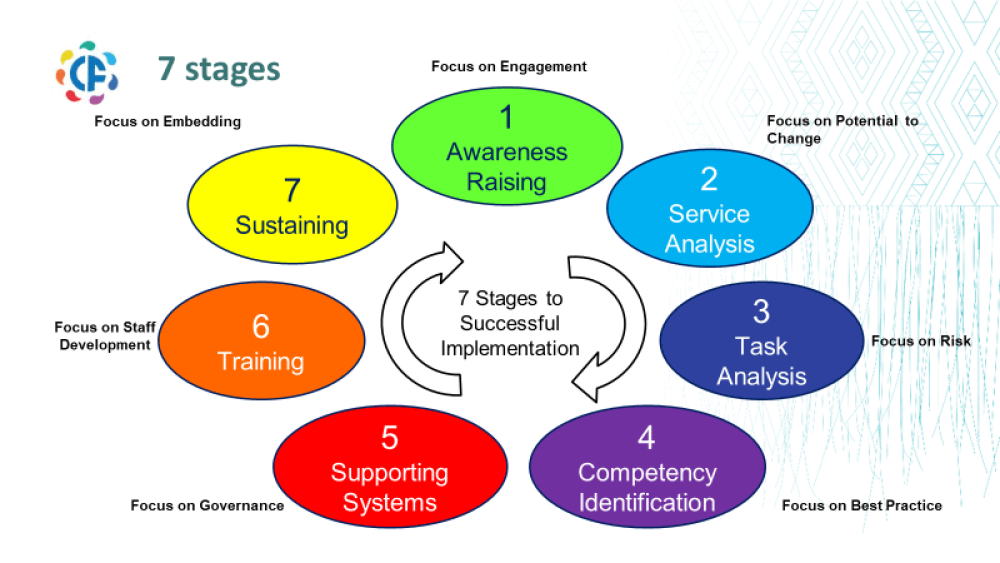On this page
About the Framework
Led by clinicians, the framework provides a 7 step format to facilitate a ‘best for patient, best for system’ approach. It can be implemented in both acute and community settings across varied teams and professions. It provides opportunities to optimise workforce capacity, supporting staff to work to top of scope, identifying opportunities to:
- skill-share and delegate
- standardise patient care
- improve service efficiencies.
The below graphic provides an overview of the 7 stages.
The CF methodology is a formal, risk managed and structured framework which creates quality, efficient, responsive, and clinically governed services by:
- Engaging staff by raising awareness of the drivers for change
- Undertaking an analysis of current service provision and identifying tasks carried out in teams
- Deciding which tasks can be delegated or skill-shared across professional boundaries
- Creating local clinical task instructions (CTIs) to standardise how tasks are carried out
- Providing structured training and competence assessment for professional skill-sharing and delegation practice
- Establishing governance processes to support clinicians
- Embedding systems to sustain the model of practice in the long term.



The image shows the 7 stages of the CF framework:
- Awareness raising — focus on engagement
- Service analysis — focus on potential to change
- Task analysis — focus on risk
- Competency identification — focus on best practice
- Supporting systems — focus on governance
- Training — focus on staff development
- Sustaining — focus on embedding.
7 stages of the Calderdale Framework
Implementing the Calderdale Framework
The Calderdale Framework was first introduced into Aotearoa New Zealand in 2015 by the Te Waipounamu (South Island) Executive Directors of Allied Health for the 5 Te Waipounamu District Health Boards. It was part of a strategic approach envisioned to:
- expand the capacity and capability of an allied health assistant workforce
- support professional skill sharing within allied health services.
In 2018 a Cultural position statement was developed and recommendations integrated within the framework.
This document has been prepared for facilitators as a guide to cultural considerations in relation to implementation of the Calderdale Framework.
Position Statement on Implementation of the Calderdale Framework [PDF, 347 KB]
Cultural position statement [PDF, 410 KB]*
*Acknowledgement Hector Matthews, Executive Director, Māori and Pacific Health, Canterbury District Health Board and Te Waipounamu Workforce Development Hub Steering Group
Wider implementation of CF
The implementation of the Calderdale Framework was initiated within the Allied Health workforce however, the methodology is applicable across health workforces and as a methodology for change has had recognition by the Te Waipounamu Directors of Nursing and has been used in nursing-specific workforce projects.
There is continuing and active use of the methodology across Health New Zealand | Te Whatu Ora Te Waipounamu region. Opportunities to engage with scientific and technical services has also commenced in a number of districts.
The Te Waipounamu Calderdale Practitioner group has also supported the training and uptake of the Calderdale Framework in other areas of New Zealand.
Implementation examples
- Shaping our South Island Allied Health workforce – The Calderdale Framework in Action [PDF, 103 KB]
- Living fully and free of falls [PDF, 1.3 MB]
- Strengthening Allied Health assistants' clinical skills [PDF, 1.7 MB]
- Rehabilitation in the community [PDF, 410 KB]
- Increasing access to Allied Health [PDF, 1.8 MB]
Becoming a Calderdale facilitator
The Calderdale Framework is applied under licence and has defined steps and processes, with an extensive library of resources to support each of the process steps. The success of its application is dependent on the training of Facilitators in its use. The CF training programme is offered by Calderdale Framework Practitioners and supported by the Te Waipounamu DAHs.
Foundation workshop
The first step of the training pathway is the Foundation Workshop. Participants who have completed the Foundation Workshop can then elect to undertake the CF Facilitator training programme.
Facilitator workshop
The Facilitator Workshop is offered over 4 days – 3-day Stage 1 workshop and 1-day Stage 2 workshop. The workshops are scheduled about 6 months apart. As part of the training, CF trainees are to:
- attend all training days,
- begin implementing CF in their service between the Stage 1 and 2 workshops, and report on this for peer review in an informal presentation
- present Foundation (1-day) CF workshops and support teams in their District to implement the CF
- submit a written report and reflection on their CF implementation experience demonstrating understanding of the methodology, to be assessed by CF Practitioners.